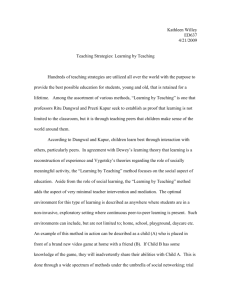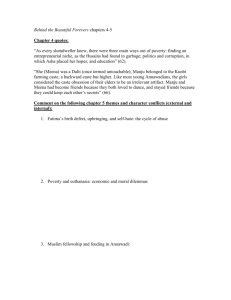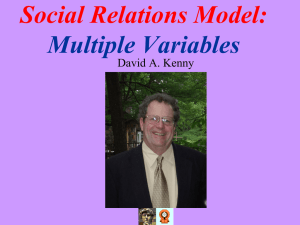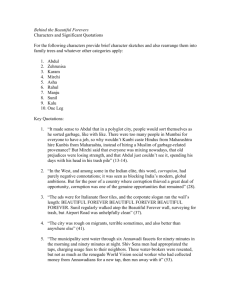psychological exploration of extrovertedwomen characters in manju
advertisement
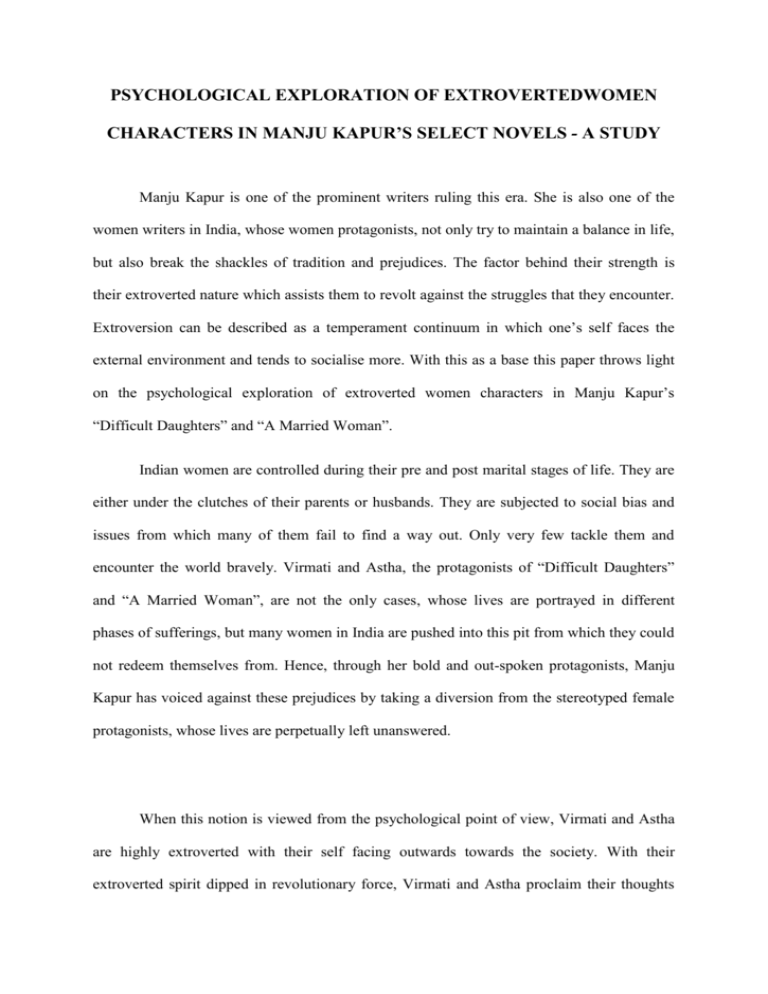
PSYCHOLOGICAL EXPLORATION OF EXTROVERTEDWOMEN CHARACTERS IN MANJU KAPUR’S SELECT NOVELS - A STUDY Manju Kapur is one of the prominent writers ruling this era. She is also one of the women writers in India, whose women protagonists, not only try to maintain a balance in life, but also break the shackles of tradition and prejudices. The factor behind their strength is their extroverted nature which assists them to revolt against the struggles that they encounter. Extroversion can be described as a temperament continuum in which one’s self faces the external environment and tends to socialise more. With this as a base this paper throws light on the psychological exploration of extroverted women characters in Manju Kapur’s “Difficult Daughters” and “A Married Woman”. Indian women are controlled during their pre and post marital stages of life. They are either under the clutches of their parents or husbands. They are subjected to social bias and issues from which many of them fail to find a way out. Only very few tackle them and encounter the world bravely. Virmati and Astha, the protagonists of “Difficult Daughters” and “A Married Woman”, are not the only cases, whose lives are portrayed in different phases of sufferings, but many women in India are pushed into this pit from which they could not redeem themselves from. Hence, through her bold and out-spoken protagonists, Manju Kapur has voiced against these prejudices by taking a diversion from the stereotyped female protagonists, whose lives are perpetually left unanswered. When this notion is viewed from the psychological point of view, Virmati and Astha are highly extroverted with their self facing outwards towards the society. With their extroverted spirit dipped in revolutionary force, Virmati and Astha proclaim their thoughts daringly and fight for their right, which they attain in the later part. They reach their destination in protesting against the deep-rooted family values and principles of marriage, which is the core interest in both the novels. They can be regarded as the reflections of the extroverted nature as ever mentioned in the Indian literature in particular. They have also emerged as new women among the Indian voices. “Difficult Daughters” is fore grounded during the period of Indian partition. The novel covers the colonial period, yet the novel revolves around the axis of anti-colonialism. The plot throws light on the protagonist Virmati, who has fallen in love with the married man and the conflicts that she faces externally and internally. One of her utterances in the beginning of the novel where she makes a comment about her mother as “the one thing I wanted was not to be like my mother”, gives a clear idea of her determined extroverted nature in pouring out her thoughts. Virmati throws her own self towards the society, though she faces many conflicts in both phases of life. Though she was strongly caught between the passion of flesh and passion for coming up, instead of being hidden under the darkness of the conventions, she breaks those chains and finds her own identity. The original cause behind this both mental and social success is her extroverted nature which is again evident through her words when she was locked in a Godown. It goes as “they still lock me in the godown. Each time I hear the door shut, I burn with anger and humiliation. I am just like the sacks of wheat and dal.” With such a firm attitude she denies the old social values, which, in the name of custom, compress women into a hollow shell of solitude. In all the phases of her troubles, Virmati, with her extroverted temperament never failed to speak out her thoughts, because of which she was able to exercise her right and choices at the point of her family, dignity, identity and self respect. “A Married Women” is again set amidst the conflicts of love and has the backdrop as the aftermath of Babri Masjid. The essence of the novel is the entire journey of the protagonist, Astha, in her own life. Unlike Vitrmati, her protests are not loudly heard, but still she finds an escape from the stings of society and its conventions with her own conflicts. Her sense of extroversion is revealed through her brave decisions that assist a great deal to find a way out for herself by the end, uncared for the society or her own family which hampered her inner self until then. Though Astha, is depicted as an introspective nature in the beginning, she projects herself in the end and her extroverted self which strives hard to attain success. Astha’s life with her first husband though was happy externally, she found the inner happiness missing that leads her to soulfully find Aijaz for herself. But even Aijaz’s loss does not turn her spirits down since she is dare enough to get acquainted with Pipeelika, a widow, with whom she finds the peace that was lost. Astha breaks the laws of nature and even society, in her relationship with Pipeelika. In these ways, her extroverted activities do not imply that she wanted to be superior to man, but she longed for the equality and something beyond that in order to fulfil her duties at home and in all the undertakings. Such thoughts act as an aspiration for her to evolve into a new woman of revolting nature. This can be testified when she says “Really Ma, don’t you think women can be responsible for their own investments?” Manju Kapur’s portrayal of her protagonists, who are being placed rightly in the extroverted continuum, has displayed the ripened comprehension of the female psyche and the inner subtlety and rigidness of a woman’s mind. Virmati’s level of extroversion is disclosed through her stern out spoken nature, whereas in the case of Astha, her welldetermined and action oriented-deeds throws her out as an extrovert. Both of them appear to be the embodiment of extroverted nature, who raises their voice against the stale customs and prejudices of the society. Apart from these external factors, they seek out for a balance of their inner conflicts caused by both abstract and concrete entities. A close psychological study of the protagonists of Manju Kapur’s “Difficult Daughters” and “A Married Women”, has thus explored their extroversion continuum, which has been an hidden agenda behind their incessant protests against the obstructs of the male chauvinistic and oppressing society and created a platform for themselves, where they will be treated with equanimity. REFERENCE Kapur, Manju.(2002). A Married Woman. New Delhi: India Ink. Kapur, Manju.(2002). Difficult Daughters. India: Penguin books with Faber and Faber. Agarwal, Malti.(2007). New Perspectives on Indian English Writings. Atlantic Publishers.

